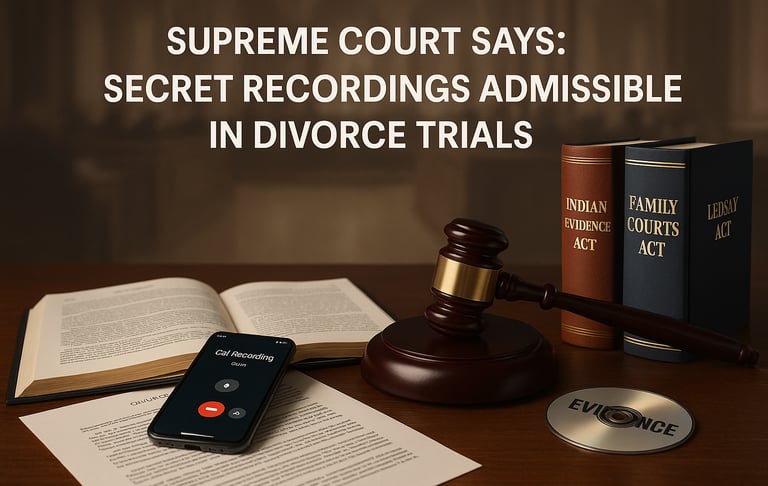Supreme Court Upholds Admissibility of Secretly Recorded Telephonic Conversations in Divorce Cases
Supreme Court rules secretly recorded calls between spouses admissible in divorce cases. Know your legal rights with divorce lawyer in Delhi.
Adv. Nadeem Saifi | Partner | Altius Astra Attorneys
7/14/20253 min read


In a significant ruling that reshapes the evidentiary landscape of matrimonial disputes, the Hon’ble Supreme Court in Vibhor Garg v. Neha, 2025 LiveLaw (SC) 694, has held that a secretly recorded telephonic conversation between spouses can be admissible as evidence in matrimonial proceedings.
This judgment marks a crucial turning point, particularly for clients seeking justice in emotionally charged divorce or cruelty cases where documentary evidence or third-party witnesses are often missing.
The Legal Crux: Section 122 of the Indian Evidence Act & Right to Privacy
At the heart of this landmark decision lies the interpretation of Section 122 of the Indian Evidence Act, 1872, which bars disclosure of communications between spouses. However, the Court made it abundantly clear that this bar is not absolute. In proceedings between spouses, such as a divorce petition, the privilege under Section 122 stands diluted.
The Bench comprising Justice B.V. Nagarathna and Justice Satish Chandra Sharma held:
“Section 122 of the Evidence Act does not touch upon the right to privacy under Article 21. It recognises the right to a fair trial and permits relevant evidence to be brought on record, even if recorded without the knowledge of the other spouse.”
This ruling directly overturns the Punjab & Haryana High Court’s earlier position that such recordings violated the wife’s right to privacy and were thus inadmissible.
Background of the Case: Privacy vs. Proof
The matter arose from a divorce case where the husband sought to introduce audio recordings of his wife’s phone conversations, captured secretly over different periods. The Family Court at Bathinda had allowed their submission, considering them crucial to proving cruelty.
However, this was later struck down by the Punjab & Haryana High Court, citing a “clear breach of fundamental right to privacy.” The High Court ruled that such clandestinely recorded conversations could not form admissible evidence.
The Supreme Court disagreed.
Supreme Court’s Rationale: Balance of Rights
The apex court emphasized that while right to privacy is constitutionally protected under Article 21, it cannot override the right to a fair trial, especially in the delicate arena of matrimonial litigation.
In words that will resonate with many couples navigating divorce, the Court stated:
“If the marriage has reached a stage where spouses are actively snooping on each other, that is itself a symptom of a broken relationship. The law cannot close its eyes to such reality.”
This pragmatic and nuanced approach is a welcome relief for estranged spouses, particularly those enduring mental cruelty, who struggle to present “proof” of private abuse within the confines of marriage.
Practical Implications for Clients & Advocates in Delhi NCR
As a practicing Family Court lawyer in Delhi with extensive experience in divorce and domestic violence matters, I often come across cases where the lack of eyewitnesses or written evidence weakens the case.
This ruling empowers both petitioners and respondents to bring forth digital recordings, including mobile phone conversations, provided proper safeguards of authenticity and relevance are followed.
Key Takeaways for Litigants:
Recordings must be relevant to the allegations made (e.g., mental cruelty, threats).
The Court must ensure that the evidence is genuine and not manipulated.
Privacy concerns will not trump the right to establish truth in divorce trials.
Legal and Ethical Boundaries Still Apply
While the Court upheld admissibility, it cautioned against misuse and encouraged Family Courts to exercise judicial discretion under Section 14 of the Family Courts Act, 1984.
The ruling does not give blanket permission for snooping or surveillance. Each piece of evidence must be assessed on its context, authenticity, and impact on the right to a fair trial.
Why This Matters for Spouses Facing Marital Disputes
If you're in the middle of a divorce case in Delhi, or contemplating filing for one, this judgment could strengthen your position, especially if verbal abuse or private conduct is at the center of your allegations.
Whether you're seeking advice for a Section 13 HMA divorce, mental cruelty, or evidence admissibility, consult a trusted matrimonial lawyer in Delhi NCR who understands both the law and the emotional sensitivity involved.
Altius Astra Attorneys
A premier law firm based in Delhi, India, offering legal representation across various practice areas for citizens rights and interests.
© 2025. Altius Astra Attorneys. All rights reserved.
Contact Us
📞 9899290789, 9818786756
📧 contact@altiusastra.com
3C-ED Block, Madhuban Chowk, Pitampura, Delhi-110034
DISCLAIMER
